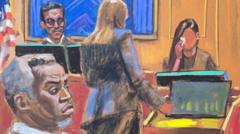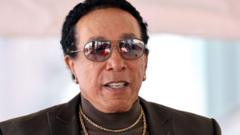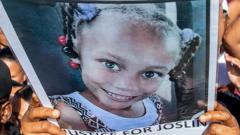The enduring saga of the Menendez brothers reaches a critical juncture as they petition for freedom through a resentencing hearing scheduled to commence in Los Angeles. Erik and Lyle Menendez, convicted for the 1989 murders of their parents, Kitty and Jose Menendez, are currently serving life sentences. Their high-profile case, reignited by a recent Netflix series, raises deep-seated questions regarding morality, justice, and the nature of familial abuse. The outcome of the hearing may not only impact their respective sentences but could also pave the way to their eligibility for parole.
Menendez Brothers Seek Freedom: A Decades-Long Battle Resumes

Menendez Brothers Seek Freedom: A Decades-Long Battle Resumes
In Los Angeles, a pivotal resentencing hearing is set to determine the future of Erik and Lyle Menendez, whose murder case continues to evoke divided opinions across America.
In their trials, the brothers faced a daunting prosecution that accused them of premeditated murder to secure a $14 million inheritance. Despite admitting to the killings, they claimed it was self-defense after enduring years of severe abuse from their father. The 1993 trial marked a significant moment in television history, airing live and capturing the public's imagination. Following a mistrial, the brothers were ultimately convicted in 1996.
The forthcoming hearing will not re-evaluate their guilt but will scrutinize evidence that illuminates their lives behind bars and the impactful transitions they have undergone while incarcerated. Their legal representatives aim to highlight these facets to argue in favor of a more lenient sentence. Distinctly important, testimony may include family members—a mix of supporters and critics—offering varied perspectives on their actions and motives.
Despite the potential for a reduced sentence, the brothers would still need to prove their rehabilitation to the parole board before any release is realized. The push for resentencing emerged from recent motions citing new evidence of ongoing abuse, suggesting that societal attitudes towards such allegations have evolved since the original trial.
Under scrutiny, the Los Angeles District Attorney’s Office plans to counter the brothers' claims, demonstrating that they maintain an unrealistic understanding of their crimes. The outcome of this hearing, which could extend into Friday, remains uncertain, with Judge Michael Jesic poised to evaluate the case's merits. A ruling may signify not only a shift in the Menendez brothers' lives but could also reflect broader dialogues about justice and redemption in America.
As the judicial process takes its course, many await the implications this case may have—not only for the Menendez brothers but for the societal understanding of familial abuse and the legal handling of such deep-seated issues.
The forthcoming hearing will not re-evaluate their guilt but will scrutinize evidence that illuminates their lives behind bars and the impactful transitions they have undergone while incarcerated. Their legal representatives aim to highlight these facets to argue in favor of a more lenient sentence. Distinctly important, testimony may include family members—a mix of supporters and critics—offering varied perspectives on their actions and motives.
Despite the potential for a reduced sentence, the brothers would still need to prove their rehabilitation to the parole board before any release is realized. The push for resentencing emerged from recent motions citing new evidence of ongoing abuse, suggesting that societal attitudes towards such allegations have evolved since the original trial.
Under scrutiny, the Los Angeles District Attorney’s Office plans to counter the brothers' claims, demonstrating that they maintain an unrealistic understanding of their crimes. The outcome of this hearing, which could extend into Friday, remains uncertain, with Judge Michael Jesic poised to evaluate the case's merits. A ruling may signify not only a shift in the Menendez brothers' lives but could also reflect broader dialogues about justice and redemption in America.
As the judicial process takes its course, many await the implications this case may have—not only for the Menendez brothers but for the societal understanding of familial abuse and the legal handling of such deep-seated issues.




















